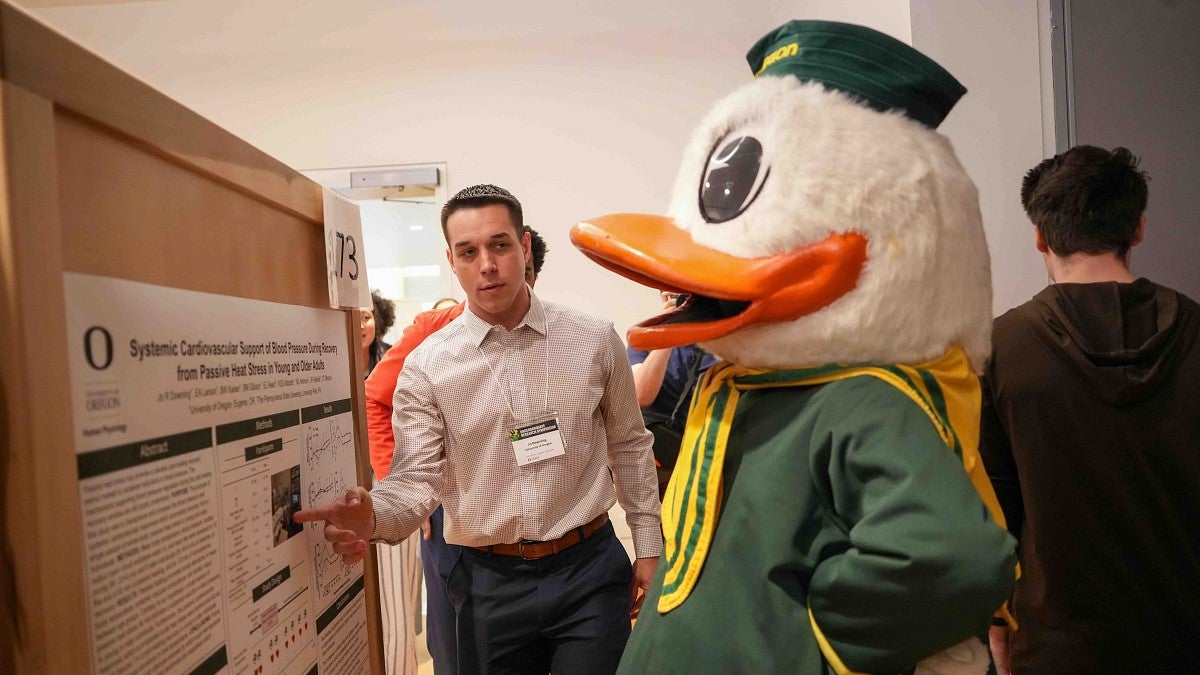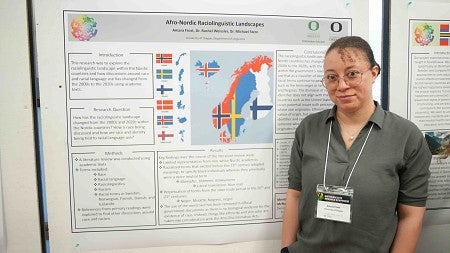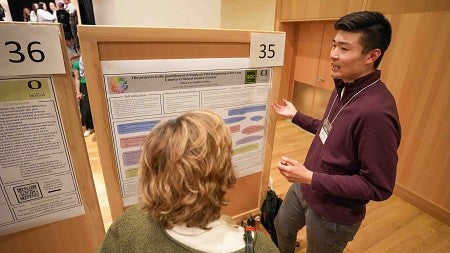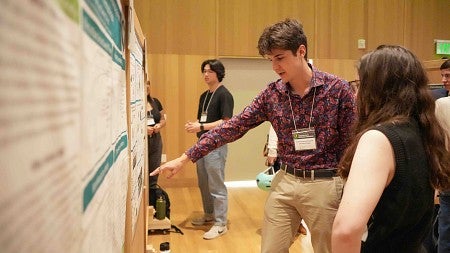
June 25, 2024 - 2:00pm
From microscopic creatures to planets orbiting distant stars, undergraduates in the College of Arts and Sciences focused their lenses on some of the world’s unanswered questions, both large and small, during the 2024 Undergraduate Research Symposium.
Nearly 500 students from across the University of Oregon shared their research projects and creative works at the annual event, which celebrates undergraduate contributions in the humanities, natural sciences, arts and social sciences.
With more than 400 presentations across 73 majors and 77 minors, the symposium offered a cross-section of the diversity and scope of undergraduate research taking place in CAS and beyond.

“We have a huge variety of student research here. I think it’s pretty cool,” said Amara Frost, a third-year linguistics and Scandinavian double major.
A record 329 undergraduate presenters received funding for their research this year, said Kevin Hatfield, Assistant Vice Provost for Undergraduate Research and Distinguished Scholarships and chair of the symposium’s steering committee.
While some conducted individual research projects, others assisted with ongoing faculty-led research in the field or in labs across campus.
Environmental science major Adrienne Rizzo participated in a research group led by Lauren Ponisio, assistant professor of biology, who studies how habitat restoration affects diversity in pollinator populations.
“What we were presenting here was built on the work of 10 years of other teams,” said Rizzo, who plans to pursue a career in ecological restoration. “This was my first-ever opportunity to do any research like that. We got to plant native wildflowers and make new habitats and communities, while at the same time helping agriculture. That’s a super cool and super rewarding thing to present to people.”
First-time presenter Kenji Clair, a third-year economics and data science major, was struck by the passion fellow presenters showed for their research.

“Everyone’s super interested in their topics,” Clair said. “It’s cool to be in an environment where everyone’s so passionate about the things they’re researching. Most people aren’t doing this as part of a class, they’re doing it out of interest.”
For students who spent the past academic year engaging in experiential learning, the symposium represented the culmination of their efforts—and the opportunity to reflect on the skills they developed through these experiential learning opportunities.
Studying salps—gelatinous sea creatures that use jet propulsion to travel through the water—gave fourth-year marine biology and environmental science major Anneliese Bishop-Perdue a crash course in underwater data collection.
“It was really exciting being part of this project because we got to learn so many different collection methods,” Bishop-Perdue said. “It sets you up to engage with graduate-level research as an undergrad in a really unique way.”
Several students said the symposium was the first time they had shared their research with an audience, allowing them to get their feet wet as presenters in an academic conference setting.

“This is the lowest-stakes environment to do it at,” Bishop-Perdue said. “The sooner you can get into a lab that connects to your interests, the more doors it opens for you. I encourage everyone to get involved so they get to have these opportunities as soon as possible.”
Keynote speaker Adie Fecker, a CAS graduate and third-year medical student at Oregon Health Sciences University, said returning to the symposium brought back memories of the impostor syndrome she felt when presenting for the first time as an undergrad.
“For a lot of us, to stand in the spotlight and be the expert in the room can be uncomfortable,” she said. “We have this belief that we are fundamentally different to everyone around us, and that can keep us from connecting with others when in reality everyone has this experience at some point.”
Brittney Lee, a fourth-year biology and human physiology major and Clark Honors College student, urged students to get involved in research on campus, regardless of their major or intended career path.
“Go for it. You never know what’s going to come out of it,” she said. “I didn’t know what I was going to get out of it, and I ended up doing research for two-plus years. It’s been just great.”
—By Nicole Krueger, College of Arts and Sciences
